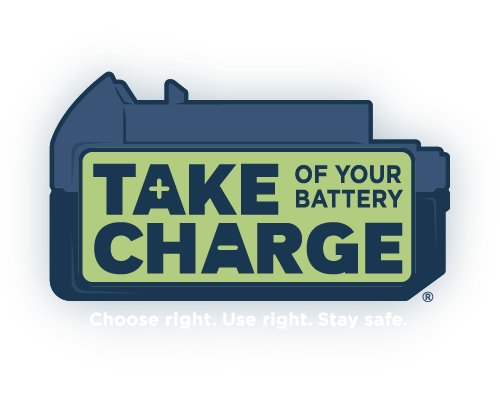“Take Charge of Your Battery” campaign educates consumers on proper selection, transport, storage and disposal to reduce the dangers of lithium-ion battery misuse.
CLEVELAND, Ohio (October 2019) – Power Tool Institute encourages consumers, contractors and educators to “take charge of their battery” and reduce potential risks associated with lithium- ion battery usage by choosing original manufacturer batteries and avoiding potentially dangerous aftermarket or counterfeit batteries.
During the last decade, there’s been an almost universal conversion to lithium-ion batteries due to higher efficiency, energy density, lower-toxicity materials, no memory effect, slow rate of self-discharge and the ability for more higher-demand power tools to be battery powered. While batteries from the original power tool manufacturer are designed to share the same circuitry and best operate with matching power tools and chargers, aftermarket or counterfeit batteries may not undergo the same safety testing and can pose additional dangers.
“While there are certainly many benefits to the use of lithium-ion batteries for power tools, it’s important to understand the risks,” said Susan Orenga, Power Tool Institute. “When these batteries are misused, or lower-quality aftermarket and counterfeit batteries are used in place of original manufacturer batteries, the high-density energy that makes these batteries so efficient can result in dangerous burns, fires or explosions. We hope to reach as many consumers, contractors and educators as possible with our “Take Charge Of Your Battery” campaign in order to minimize those risks.
Before operating a battery-powered tool, heed this advice from the experts at the Power Tool Institute, a leading voice on power tool safety issues and standards for the industry.
- Always read your manufacturer’s instruction manual (battery, charger and tool) for complete information.
- Only use original manufacturer’s system components – tool, battery and charger. Each manufacturer utilizes its own unique control circuity which allows the system to communicate properly. This system monitors and controls critical functions, such as cell balance, energy levels, flow of energy in/out and temperatures.
- Use batteries solely for the defined purpose as specified by the manufacturer and inspect your battery regularly for signs of damage, such as crushing, cuts or punctures. Do not use a battery that has received a sharp blow, been dropped or is damaged.
- Never modify, disassemble or tamper with the battery. The performance of damaged or modified batteries can be unpredictable and dangerous.
- Do not immerse the battery or allow any fluids to flow inside. Conductive liquid ingress, such as water, can cause damage resulting in fire or explosion. Store your battery in a cool, dry place, away from combustible and flammable items. Corrosive gas atmospheres must be avoided.
- Do not store or transport the battery in a container with loose metal objects, such as coins, keys or nails, which may cause short circuits to the battery terminal.
- Be mindful of abnormal battery behavior – failure to fully charge or hold a charge, longer-than-usual charging times, noticeable drop in performance, unusual LED activity when placed on a charger, liquid leakage from the battery or melted plastic anywhere on the pack. These are indications of an internal problem, and the battery should not be used.
- Use and store your battery within the temperature limits stated by the manufacturer. Do not store in a closed location where sunlight may cause elevated temperatures, such as near a window inside a vehicle.
- Store your battery in a cool, dry place, away from combustible and flammable items.
- If you suspect your battery may have a problem, do not use, ship, or discard as normal trash. Always dispose of your battery pack according to federal, state and local regulations. Contact a recycling agency in your area for recycling locations. If you suspect your battery is damaged, contact the manufacturer for disposal instructions.
About Power Tool Institute
The Power Tool Institute is the leading organization for power tool safety resources, information and education. Its members, Chervon, Festool, Hilti, Koki Holdings, Makita, Metabo, Robert Bosch, Stanley Black and Decker, Stihl, and TTI, represent market leading brands of portable and stationary power tools.
For a comprehensive resource of power tool information and safety education, visit www.powertoolinstitute.com. For more information on safe battery selection use and disposal, visit TakeChargeOfYourBattery.com.



